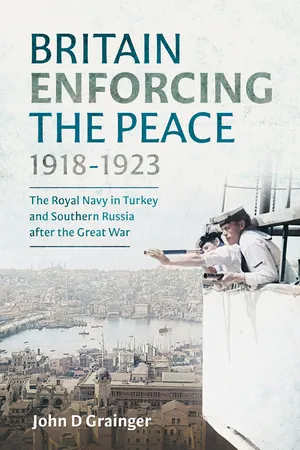
Britain Enforcing the Peace, 1918–1923
The Royal Navy in Turkey and Southern Russia after the Great War
- English
- ePUB (mobile friendly)
- Available on iOS & Android
Britain Enforcing the Peace, 1918–1923
The Royal Navy in Turkey and Southern Russia after the Great War
About this book
Details the British Navy's efforts during the post-Great War period, facing challenges in the Near East, from the Russian Revolution to Turkish resurgence under Mustafa Kemal. The end of the Great War in the Near East began with the Turkish Armistice but was not complete until the final peace treaty in 1923. During that five-year period the British Navy dealt with the overspill from the Russian Revolution in the Caucasus, the Caspian Sea and Central Asia as well, and then in the Aegean Sea and the Straits confronting the resurgent Turkish forces under Mustafa Kemal. The British in India were very concerned about Bolshevik activities in Central Asia and had sent two battalions of Indian troops under a British general to attempt to cope with it. They were successful in battle against larger forces, but politically they were unable to reach any sort of settlement. They were withdrawn when an Afghan war broke out. A second expedition was sent early in 1918 from Iraq through Persia to gain control of the oil fields at Baku in Azerbaijan. The object here was to prevent the oil falling into German or Turkish hands. This was an expedition at the limit of military capabilities, but it did succeed in seizing Baku and preventing a German conquest. In the process ships in the Caspian Sea were captured and turned into a Caspian Sea flotilla to fight Russian Bolshevik advances. These adventures happened before the Turkish Armistice. Constantinople had been occupied, but holding it became increasingly difficult and required the use of considerable forces, mainly British. The other allies gradually faded away or adopted the Turkish side. The resurgence of Turkish power in Anatolia eventually led to a tense confrontation between British and Turkish forces at Chanak on the Dardanelles and a difficult negotiation between generals. The result was a truce, British withdrawal from all occupied areas, and the collapse of the Lloyd George government in Britain, which was prepared to indulge in another war over the issues.
Frequently asked questions
- Essential is ideal for learners and professionals who enjoy exploring a wide range of subjects. Access the Essential Library with 800,000+ trusted titles and best-sellers across business, personal growth, and the humanities. Includes unlimited reading time and Standard Read Aloud voice.
- Complete: Perfect for advanced learners and researchers needing full, unrestricted access. Unlock 1.4M+ books across hundreds of subjects, including academic and specialized titles. The Complete Plan also includes advanced features like Premium Read Aloud and Research Assistant.
Please note we cannot support devices running on iOS 13 and Android 7 or earlier. Learn more about using the app.
Information
Table of contents
- Cover
- Title
- Copyright
- Contents
- Maps
- Preface
- Introduction
- Part I: Seizing the City
- Part II: A Railway, Oil, and a New Fleet
- Part III: The Black Sea and its Problems
- Part IV: Controlling the City
- Part V: The New Turkey
- Notes
- Bibliography